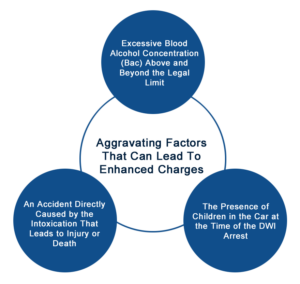DWI First Offense Texas
Under Texas law, a charge of Driving While Intoxicated (DWI) is usually considered a misdemeanor on a first offense. That said, a variety of aggravating factors can lead to more serious classifications, which can mean elevating the DWI charges from a class B to a class A misdemeanor or even prosecuting it as a felony.
A few of the aggravating factors that can lead to enhanced charges include:
- • Excessive Blood Alcohol Concentration (BAC) above and beyond the legal limit.
- • The presence of children in the car at the time of the DWI arrest.
- • An accident directly caused by the intoxication that leads to injury or death.
Barring any of those factors, however, a first-time DWI charge is usually treated as a Class B misdemeanor, which carries fewer potential penalties than a Class A misdemeanor charge.
Class A and Class B Misdemeanor vs. Felony Charges
Of the three aggravating factors listed above, the one that most commonly leads to a Class A misdemeanor charge is the presence of an excessive BAC. In Texas, just as it is throughout the country, the legal limit for operating a motor vehicle is .08 BAC as tested through breath or blood. An impaired motorist who tests at .15 or higher is more likely to receive Class A misdemeanor charges.
The reasoning behind this threshold, according to prosecutors, is that those experiencing this level of intoxication pose a greater threat to other motorists. As such, prosecutors are far less likely to reduce charges as there is a much smaller chance the defendant was unaware of their intoxication.
Offering up some of the harshest penalties among misdemeanors, a class A misdemeanor charge carries with it up to a year in county jail, up to two years of probation, maximum fines of $6,000, and a permanent spot on your criminal record.
By contrast, a class B misdemeanor charge carries less jail time and smaller fines. Circumstances will vary, but general sentencing guidelines call for up to 180 days in jail as well as fines of up to $3,000. This fine can be in addition to or in place of jail time and can be paid off over 36 months. The judge can also determine whether probation can be served instead of jail time, and there is also a chance to retain driving privileges for those willing to complete the course and/or install an ignition interlock device (IID) in their vehicle during half of their probation.
The final two aggravating factors listed above are the most likely to result in felony charges being raised against the accused. These charges carry far harsher punishments and penalties than misdemeanors.
While the nature of the charges and the circumstances of the arrest will play a role in this, you will generally be granted the opportunity to post bail and secure your release from incarceration while you await trial. For first-case DWI, the amount of this bond will run anywhere from $1,500 to $10,000. This can be obtained through paying a cash bond or seeking out a surety bond from an attorney or bail bond company. Some defendants may even be eligible for a personal recognizance (PR) bond, but any release will be contingent on conditions determined by the judge.
Should I Plead Guilty to First-Offense DWI?
There may be cases where a person charged with their first DWI would want to plead guilty – they may feel it best to accept responsibility for their actions, or they may be experiencing guilt over having broken the law. They may even be convinced by a prosecutor that a guilty plea is in their best interest. Whatever the case, it is of the utmost importance that you consult with an attorney before pleading guilty, as it is not always in your best interests.
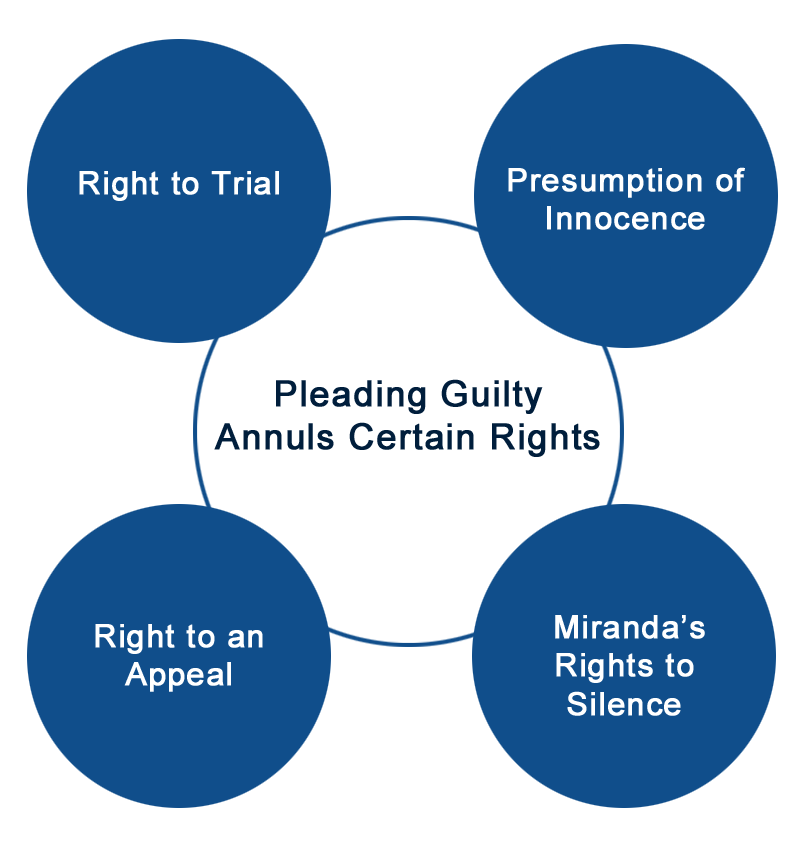 By pleading guilty, you open yourself to jail time, which can have far-reaching consequences on your personal and professional life. You will not be able to tell potential employers that you were innocent or that there was some misunderstanding, as the conviction on your record will always serve as an admission of guilt.
By pleading guilty, you open yourself to jail time, which can have far-reaching consequences on your personal and professional life. You will not be able to tell potential employers that you were innocent or that there was some misunderstanding, as the conviction on your record will always serve as an admission of guilt.
In addition, pleading guilty also annuls certain rights that you have under the law. These include:
- • Right to Trial: By foregoing the chance to appear before a judge or jury, you relinquish the opportunity to challenge the evidence against you, present your evidence, and plead your case before an impartial arbitrator.
- • Presumption of Innocence: Under the law, it falls on the prosecution to prove your guilt beyond a reasonable doubt. By pleading guilty, you abandon this legal protection, freeing them from the burden of having to prove your guilt.
- • Miranda’s Rights to Silence: The cornerstone of your rights as the accused is the protection you enjoy against self-incrimination. As part of a plea deal, you may be forced to provide a statement admitting your guilt, thus waiving these protections and rights.
- • Right to an Appeal: Decisions handed down by a judge or jury can almost always be appealed and re-litigated in an appeals court. A guilty plea, however, makes any challenge to a conviction or attempts to overturn it far more difficult.
A guilty plea is nearly impossible to withdraw after it has been entered and will result in a conviction on your criminal record that – unlike a not-guilty verdict or acquittal – cannot be expunged from your record or sealed from public view. And contrary to widely held belief, this conviction does not simply “drop off” your record after a time. It is a permanent fixture on your public record, one that can have long-lasting ramifications on your ability to build a career, find a place to live, and maintain a healthy credit rating.
First Time Offense: The Consequences
If this is your first offense for DWI in the state of Texas, you have a few factors working in your favor that could lead to charges against you being reduced or dropped. A lack of prior convictions makes it more likely that a judge will consider this an isolated incident and allow for more rehabilitative than punitive sentencing. This means they will be more likely to refer a defendant to pretrial diversion programs and alternative sentencing options like alcohol education courses, and to reduce penalties such as fines, license suspension, and probation terms.
Chances of jail time are relatively slim for first-time offenders so long as there are no aggravating factors.
While the following will help you gauge the consequences that come with a first-offense DWI in the state of Texas, each case is unique. Consider the following simple guidelines, liable to change based on the decision of the judge presiding over your case.
License Suspension
We’ll address this first, as your license suspension must be challenged within 15 days of the arrest.
During the arrest in which you were charged with DWI, the arresting officer will most likely have confiscated your physical driver’s license and given you a temporary Notice of Suspension. While you no longer have your license, your official suspension does not begin for another 40 days. Before it does, you have the opportunity to request an Administrative License Revocation (ALR) hearing within 15 days.
Once you have filed the request, your license suspension will be postponed until after the hearing. With the help of a DWI attorney, you will now have the opportunity to challenge the suspension of your license, questioning such factors as whether police had reasonable suspicion to pull you over, whether there was probable cause for administering sobriety and BAC tests, and whether there were any issues with the way the tests were administered.
A successful hearing will result in your ability to drive being preserved while potentially leading to criminal charges being reduced or dismissed. If, however, the suspension of license is upheld, a first-time offender will likely face a suspension ranging from 90 days to a year. If, however, you had an exceptionally high BAC or refused the test altogether, you can expect a range of 180 to two years. In either case, you could still potentially qualify for an occupational driver’s license which allows you to retain driving privileges for traveling between home and work or school.
This hearing is doubly important, as it gives your attorney a chance to view some of the state’s evidence against you – evidence that will play a role in the criminal case that will come later. This criminal case will determine what kind of jail time, fines, and other consequences you will face.
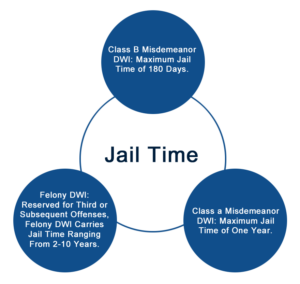 Jail Time
Jail Time
The first question you might be asking yourself after being charged with a DWI for the first time is what kind of jail time you might expect. As with most things, this varies based on whether you are charged with a class A or class B misdemeanor.
- • Class B misdemeanor DWI: maximum jail time of 180 days.
- • Class A misdemeanor DWI: maximum jail time of one year.
- • Felony DWI: Generally reserved for third or subsequent offenses, felony DWI carries jail time ranging from 2-10 years.
Regardless of the level of charges, there is also a mandatory minimum sentence of three days. While the actual sentence may vary depending on your circumstances, your jail sentence will fall somewhere between 3-180 days. Several circumstances can affect the length of your sentence. Your BAC is tested at the time of the offense, for example, or the particulars of the arrest, such as whether there were injuries, children in the car, or an accident that resulted in a death. Prior convictions for DUI, and indeed your entire criminal history, can play a role in sentencing. The judge may even factor in things such as whether or not you were speeding before the arrest to determine your sentence.
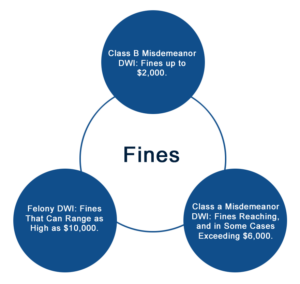 Fines
Fines
Just as typical jail sentences, even for first-time offenders, vary wildly based on the nature of the charges, the fines you could be liable for increase greatly based on whether you are charged with a class A or class B misdemeanor.
- • Class B misdemeanor DWI: Fines up to $2,000
- • Class A misdemeanor DWI: Fines reaching, and in some cases exceeding $6,000.
- • Felony DWI: Fines that can range as high as $10,000
Again, these numbers represent the maximum fine under Texas law. The actual amount of fines will be determined by the court based on various factors from prior convictions to the circumstances of your arrest.
Community Service
There are no hard-and-fast rules under Texas law that set the specific amount of community service time required if convicted, and community service hours may not even be applied. However, the Texas penal code does lay out a few general guidelines, setting the range for first-time offenders between 24-100 hours, depending on several factors.
Ignition Interlock Device (IID)
An ignition interlock device (IID) is installed on your vehicle’s ignition and ensures that the engine will not start until it reads a BAC of 0.0. Texas law does not require the installation of an IID for those whose BAC was below 0.15 at the time of arrest, but certain circumstances can lead to the installation of one either as a pretrial cautionary measure or as a condition of probation. This will largely fall to the discretion of the court.
Substance Abuse Evaluation
Going beyond the simple question of whether you were intoxicated at the time of the arrest, substance abuse evaluations determine if your dependency and abuse are a more deep-seated problem. Administered by qualified professionals and based on interviews and examinations, these evaluations help the court determine what penalties and conditions will be applied following a conviction.
Victim Impact Panel
Mandatory attendance of a Mothers Against Drunk Driving (MADD) victim impact panel is generally not part of the punishment for first-time offenders. However, a judge may decide to require it as part of a probation plea agreement. During this panel, you will hear from victims and survivors of drunk driving, as well as family members who were affected by loss, to better understand the potentially devastating consequences.
Special Note: DWI by a Minor
As the legal age to consume alcohol is 21 under Texas law, there is a separate set of consequences for those charged with DWI while underage. Called DWI by a minor and considered a class B misdemeanor, these charges can be triggered by a BAC reading as low as 0.02 (or roughly half a beer). This carries a license suspension of 60 days to a year, fines up to $2,000, and jail time of three days.
On top of these consequences, a conviction for DWI, even a class B misdemeanor, can have grievous long-term effects, ranging from potential loss of employment and issues with professional licensing to increased insurance premiums and damage to your social standing and reputation. You will also likely be required to pay court costs covering several different fees associated with litigating your case. These costs vary immensely, so the most accurate information as to costs would come from the court tasked with handling your case or the legal professional representing you.
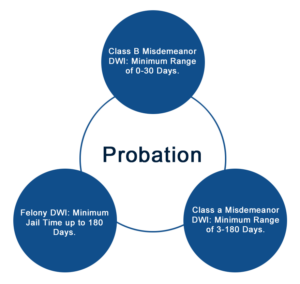 Probation
Probation
In certain circumstances, a judge may elect to grant probation to those convicted of first-time DWI, allowing you to forego any jail time in exchange for meeting certain court-imposed conditions and rules for a period of up to two years. Your eligibility for probation is largely at the judge’s discretion but will be based on several factors including the circumstances of the case and your criminal history.
While this probation does allow you to reduce your sentence in exchange for following certain conditions, Texas law does require certain concessions, including mandatory drug or alcohol dependence evaluation and a minimum number of days spent in jail as a condition of your probation.
- • Class B misdemeanor DWI: Minimum range of 0-30 days
- • Class A misdemeanor DWI: Minimum range of 3-180 days
- • Felony DWI: Minimum jail time up to 180 days
If granted probation, you will be expected to comply with several conditions including:
Routine Testing
Administered to ensure you remain in compliance with the court’s efforts at rehabilitation, this routine testing will allow for regular accurate measurement of any drugs or alcohol in your system.
DWI Education Classes
Overseen by the Texas Department of State Health Services (DSHS), these classes seek to educate as to the dangers and consequences of driving while intoxicated, the effects these substances have on you physically, the laws revolving around DWI, and strategies that could help avoid further incidents. The total amount of class time will vary but will generally range between 12-32 hours.
Meetings with a Probation Officer
One condition of probation that is almost always enforced is a series of regular meetings with a probation officer. As part of these meetings, the probation officer will ensure that you are complying with terms and conditions, check your progress, and provide advice on meeting benchmarks.
These are in addition to other potential conditions including installation of an IID and compulsory attendance at a victim impact panel. In addition, probation always carries mandatory substance abuse evaluation.
Should I Refuse to Be Tested?
The state of Texas has what is called an “implied consent law,” meaning that by simply driving in your car, you agree to be chemically tested by law enforcement, either by a breathalyzer or blood analysis, if they suspect you of drunk driving. That said, you are legally free to refuse either test. But you should know that there are legal consequences in doing so.
For starters, the officer may still move forward with the arrest and subject you to a suspension of your license. Only the suspension can last for up to 180 days for a first-time offense. If you have any priors on your record, either license suspensions or DWI convictions, that suspension can be even longer.
Officers may also test your sobriety through Field Sobriety Tests (FSTs) which include holding a one-legged stance, walking in a straight line and turning, and tracking your eye movement through a horizontal gaze nystagmus test. These tests are entirely voluntary, and you are legally entitled to refuse them. However, while they may make it more difficult for law enforcement to prosecute you later, you may still be arrested based on other evidence (slurred speech, alcohol, behavior, etc.) and charged with DWI.
How Can I Beat a First-Offense DWI Charge?
In defending against a DWI charge, it’s important to first note that no two DWI charges are the same. You may have a friend or acquaintance who was charged with DWI and think that your case will be similar, but a multitude of factors weigh into your case that can have significant impacts on the outcome. If you consented to testing, or if the arrest was recorded, refuting that evidence will play into your defense’s strategy.
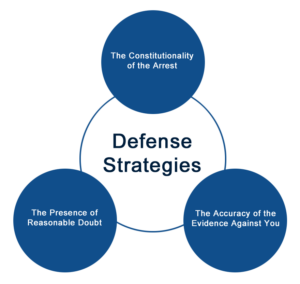 Challenging that evidence is the cornerstone of any good strategy to dismiss or reduce DWI charges. Remember that under the law you are presumed innocent. A few strategies that have proven successful include challenging:
Challenging that evidence is the cornerstone of any good strategy to dismiss or reduce DWI charges. Remember that under the law you are presumed innocent. A few strategies that have proven successful include challenging:
- • The Constitutionality of the Arrest: Was the evidence against you collected by the law and handled according to procedure? Any failure to uphold police protocol could threaten your constitutional rights, opening the door to having evidence excluded and your case dismissed.
- • The Accuracy of the Evidence Against You: Even something as tried-and-tested as BAC testing must be done by strict scientific guidelines. Any issues with the way the tests were administered can weaken their results’ usefulness as evidence. Additionally, the qualifications of those giving the test or the reliability of witnesses can all be called into question.
- • The Presence of Reasonable Doubt: The prosecution’s job is to prove your guilt beyond a reasonable doubt. Questioning every bit of evidence they’ve laid out, raising suspicions about the accuracy of the narrative they’ve created, helps that doubt grow, making it significantly more difficult to prove your guilt.
After creating sufficient doubt around the evidence against you, your attorney can convince prosecutors that their case is tenuous at best. With the prosecution operating at a disadvantage, they’ll be far more amenable to a plea bargain, reducing charges or agreeing to decrease penalties rather than lose the case outright. Some of the biggest reasons prosecutions agree to plea bargains include:
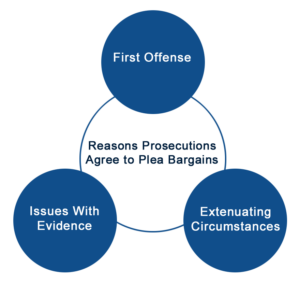 • First Offense: If this is your first offense and your record is otherwise clean, prosecutors may be more inclined to reduce charges to something less severe like reckless driving or a moving violation.
• First Offense: If this is your first offense and your record is otherwise clean, prosecutors may be more inclined to reduce charges to something less severe like reckless driving or a moving violation.- • Extenuating Circumstances: There are times when an actual emergency leads to committing DWI. Proving that you had no other option but to risk arrest can often lead to reduced charges.
- • Issues With Evidence: As outlined above, there are several ways to challenge the evidence against you. This is far and away the most successful method for reducing or dismissing charges, challenging evidence through pretrial motions or at trial, showing a lack of probable cause, illustrating where legal procedures weren’t followed, and questioning the credibility of witnesses.
The most important strategy is the one you follow first, contacting an experienced DWI attorney to craft a defense around your unique situation. Their deep knowledge of Texas law, legal precedents, the judge and prosecution, and the strategies available to you can help you fight your DWI charge.
The Best Preparation, The Best Defense
At The Law Office of Ken Gibson, we know that the side who knows more about the case walks up to the negotiating table and into the courtroom with a massive advantage. So, we prepare more than the prosecution, digging into the evidence and the particulars of the case as we develop a relationship with each client.
Don’t let a DWI conviction hurt your ability to live your life and enjoy your freedom. There are ways to fight back, and we know them like few other law firms do. Look through our case examples, learn how we’ve helped countless clients just like you, and then schedule a free, no-obligation evaluation of your case. Then let’s get to work helping you take back control of your life.
Call 1 (866) 875-5996 or Schedule a Free Case Evaluation Online

